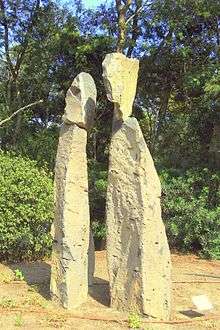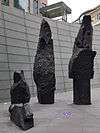Xavier Corberó
Xavier Corberó i Olivella, known as Xavier (or Javier) Corberó (Barcelona, 13 June 1935 - Esplugues de Llobregat, 24 April 2017) was a Catalan sculptor. He is best known for monumental public sculpture, and was also the designer of the 1992 Summer Olympics medals.[1]
Xavier Corberó | |
|---|---|
 Sculpture in Calella de Palafrugell | |
| Born | 1935 |
| Died | 2017 San Joan Despi |
| Nationality | Spanish / Catalan |
Life
Corberó was born in 1935 in a family of metalworkers and silversmiths, originally from Lleida. In the late 1950s he became the first-ever Spanish student at the Central School of Arts and Crafts in London and went on to work for a while in Lausanne, Switzerland.
He married actress Mary-Ann Bennett Coates in 1959. They separated in 1970. Their daughter Ana Corberó was born in 1960.
In 1967 he acquired an ancient house and plot of land in Esplugues de Llobregat, a village in the outskirts of Barcelona, and developed it extensively until his death in April 2017 into a highly elaborate complex of houses (largely devoted to hosting artists-in-residence, as well as his own residence) and exhibition spaces, which also houses a significant sample of his sculptures and personal collections.[2]
Work
Corberó had his first individual exhibition in Munich in 1963, for which he received a Gold medal from the State of Bavaria. Later exhibitions included shows in New York City, Japan, and multiple European countries.
His monumental sculptures can be seen in Barcelona, London (Broadgate), Santa Cruz de Tenerife, Beirut (Souks), Kuwait City, Chicago (lobby of 77 West Wacker Drive), New York City (outside the Metropolitan Museum of Art), as well as in numerous museums including the Meadows Museum in Dallas.
He was chosen to design the medals for the 1992 Summer Olympics in Barcelona. That same year, he received the Creu de Sant Jordi Award from the Generalitat de Catalunya.
Gallery
- Monument to Josep Tarradellas (1998), Barcelona
- La Familia, public sculpture in Barcelona
- Al·legoria a la vida, Barcelona
 Homage to the Mediterranean, Barcelona
Homage to the Mediterranean, Barcelona Familia Vapor in Tarrassa
Familia Vapor in Tarrassa
 Samurai, Esplugues de Llobregat
Samurai, Esplugues de Llobregat- Monument to Nicolau Maria Rubió i Tudurí
_Recinte_de_la_Masia_del_FC_Barcelona%2C_Barcelona_(13671250184)_(2).jpg) La Barca del Barça (1987) on the grounds of FC Barcelona
La Barca del Barça (1987) on the grounds of FC Barcelona Trobada (2005), monumental group in Esplugues de Llobregat
Trobada (2005), monumental group in Esplugues de Llobregat Ejecutores y ejecutados, Tenerife
Ejecutores y ejecutados, Tenerife
References
- "Fallece Xavier Corberó, diseñador de las medallas de Barcelona'92". La Vanguardia. 25 April 2017.
- Brooke Anderson (2017). "A Sculptor's Labyrinthine Home, Still a Work in Progress". The Wall Street Journal.